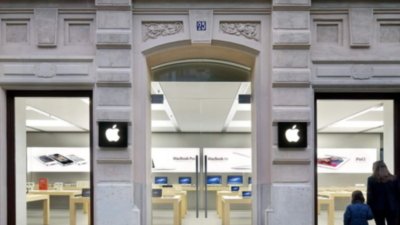To a degree, Apple could actually benefit from the impacts of climate change with the iPhone a crucial part of a customer's readiness for a crisis, the company said in an unusual statement made public on Tuesday.
"As people begin to experience severe weather events with greater frequency, we expect an increasing need for confidence and preparedness in the arena of personal safety and the well-being of loved ones," the company wrote in a submission to the non-profit Carbon Disclosure Project, seen by Bloomberg. The CDP grades companies on their awareness and response to climate change.
Products like iPhones "can serve as a flashlight or a siren; they can provide first aid instructions; they can act as a radio; and they can be charged for many days via car batteries or even hand cranks," Apple said.
It's not clear whether Apple cited any downsides to the company's business as a result of climate change. Some direct impacts could include property damage from fire, storms, or flooding, and tougher water access at facilities like its Arizona data center. Apple has a presence in a number of at-risk places, ranging from San Francisco to Tokyo.
Indirectly, the economic hardship caused by climate change could sabotage the company's customer base.
Apple is presumably concerned, as it was one of 30 U.S. companies to receive an "A" from the CDP, some others being Home Depot and Johnson & Johnson. That may still not bode well for the environment though, given that north of 1,800 U.S. companies submitted CDP reports for 2018. Worldwide, over 7,000 businesses made submissions.
Some of Apple's attempts to offset carbon emissions include protecting forests and worldwide investments in clean power. All of its first-party operations use renewable energy, and the company has been working to soften the damage caused by its supply chain.
Observers have pointed out that Apple's logistics remain a pollution source, and that by its very nature the company depends on increasing resource consumption to turn a profit.
 Roger Fingas
Roger Fingas








 William Gallagher
William Gallagher
 Christine McKee
Christine McKee
 Stephen Silver
Stephen Silver

 Charles Martin
Charles Martin


 Amber Neely
Amber Neely








77 Comments
This article prompts me to get hang cranks / solar cel USB charger which I didn't realize it exists.
Climate constantly changes, to think we can actually have any impact on significantly altering the climate is the height of arrogance. It's been warmer in the past than today and its been cooler, we know this..... but somehow altering a carbon footprint is going to save us? This is not to say that we should not try and be prudent in the use of resources, but the proposed changes all mandate government control of your life and all that will do is make things worse for people, not better.
Very well said. I agree with your statement. This is all about increasing power and control of citizens.
So, not just trying to sell people stuff?